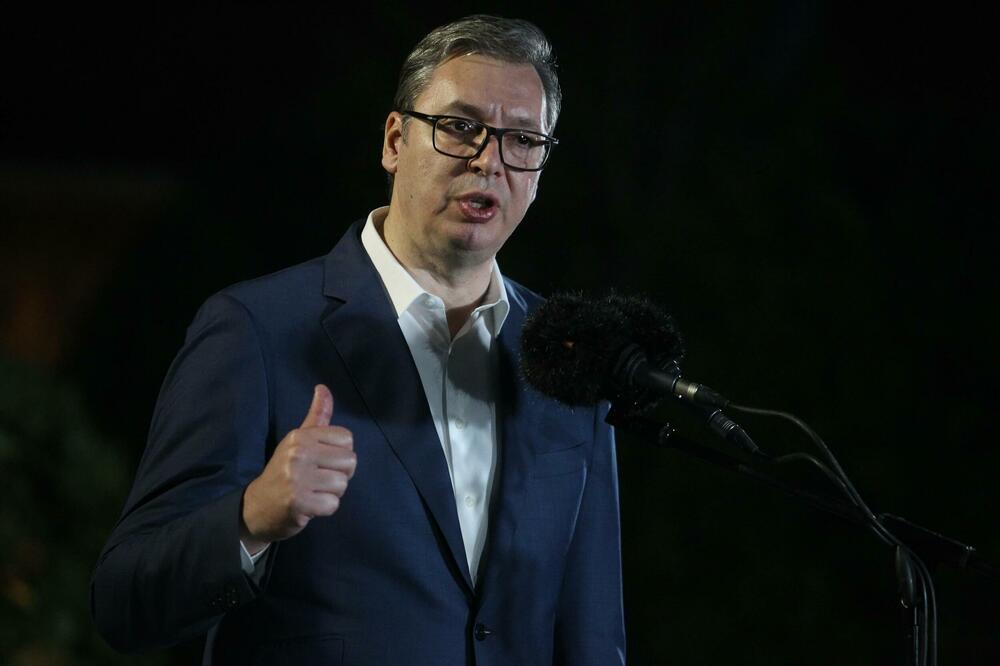When dealing with the reign of Aleksandar Vučić, critics too often focus on his personality and the symbolic and verbal violence that he incites and produces with his rhetoric and political activity.
It is true that he raised aggressiveness towards political opponents to a mandatory measure of behavior not only for himself but also for the entire progressive hierarchy. At the same time, there is a political culture of manipulation, the conscious generation of untruths, the silencing of the essential and the campaign's focus on the unimportant, etc. became a routine technique of ruling.
Everyone who dared to publicly criticize him felt retribution in one way or another. Even Voltaire knew: If you want to find out who has power over you, find out who you can't criticize.
However, this technique could not ensure a successful autocratic rule if it did not stand on two more pillars - on structural and cultural violence, and if it was not supported by techniques of domination and propaganda. Johan Galtung, a Norwegian sociologist who died in February of this year, co-founder of the Institute for Peace Research from Oslo, created a model according to which violence is generated in the triangle of personal, structural and cultural violence.
Structural violence in Serbia
According to Galtung, structural violence is "the restriction of basic human needs or, more generally, of life, which reduces the actual degree of satisfaction of those needs below what would potentially be possible".
Discrimination - the unequal treatment of equal people - is at the heart of structural violence. In a society steeped in corruption, in the so-called cousin-brother system and partocracy, there are privileged and underprivileged.
Regardless of whether it is a competition for a job in a poor municipality in the south or the allocation of construction land in elite locations in the capital, to name just two examples, the party card along with knowing the right people in the right place are the basic criteria for success. That is why in the municipal services and throughout the state hierarchy, you have a large number of eligible people with easily acquired diplomas from private institutions, while the most capable respond to discrimination by going abroad or being employed by foreign companies. This political-nepotist segregation is one of the most powerful mechanisms of government, and this discriminatory practice as structural violence is a method of constantly increasing the blackmailing potential of the government.
Cultural violence with the aim of ideological legitimization of existing power relations is perpetrated on behalf of the government by those public workers - Gramsci called them "organic intellectuals" - who are allowed to dominate and spread their views unhindered in the apparatus of cultural hegemony. It's just that even Gramsci would have had a hard time imagining a gallery of characters from "Ćirilica" by Milomir Marić.
Explicit nationalism and implicit chauvinism come under the umbrella of patriotism. This type of cultural violence actually redirects the individual's attention from his own position in society to the "enemy" who is targeted as needed. One time it was "Shiptarians", the second time it was "autochauvinists", the third time it was LGBT, then the "collective West". Increasing intolerance towards "enemies" reduces the critical potential towards the government that "defends the country from enemies". Managing nationalism is primarily a technique of social anesthesia.
Party booklet as social capital
According to Pierre Bourdieu, social capital is one of the decisive factors for our social status. If our networkedness in society does not depend on our communication skills, education, professional reputation, nor on our economic potency, but on our relationship with the government, then the desirable social capital in the form of a party card actually suspended our economic, cultural and symbolic capital.
Over time, such a discriminatory system of dominance of one element of social capital - correct party affiliation - over all other elements leads to severe deviations in society.
The party booklet begins to produce both economic and cultural and symbolic capital - independent of the actual skills of the individual, of his education and reputation.
Since the social reputation thus acquired is the result of structural violence - the stretching of the eligible and the appropriated and the disqualification of the ineligible and the unaccommodated - it can be called a false social reputation. Such pseudo-prestige maintains the illusion of itself only on the basis of another method of violent rule - on the basis of media manipulation. Only verified loyalists, bearers of the party's cultural and symbolic capital, have access to the microphones and cameras that cast into the depth and breadth of the nation.
The problem is that a divided society and captive institutions have no way to change the social position of false dignitaries who most often even acquired their real economic capital on the basis of political discrimination of those better than them - and on the basis of false cultural and symbolic capital.
Domination techniques
Sociology has long described the techniques of domination, actually the techniques of ruling over groups that you want to keep in a subordinate position. The Norwegian sociologist Berit Os listed the following techniques: Ignoring, ridiculing, withholding information, sending conflicting messages, imposing guilt and shame, threats.
Let's start with the obvious. A politician can show his dominance by ignoring journalists from newsrooms disaffected by the government. Or by ignoring a raised hand in the assembly - when an opposition MP wants to use the right of reply. A large number of examples would harm the text, but anyone who has lived in Serbia in the last few years or follows events in the country will remember many similar situations.
For ridicule as a technique of domination, you should look at any of the marathon public appearances of the President of Serbia. He regularly mocks absentee political opponents by demonstrating his dominance to a television audience of millions. It is no coincidence that Aleksandar Vučić does not engage in televised duels. He could be funny in them too.
Depriving the opposition and the public of relevant information about a series of affairs, tenders without public competition, important international contracts covered with the fig leaf of "state secrets", the government treats relevant information as a means of securing its own rule, and not as a good of public interest. The problem is that it dragged all the institutions into that vortex of silence about the important and endless chatter about the less important.
Sending conflicting messages can also be recorded as a dominance technique consistently applied by the government. When the president, when asked why he did not keep his word, says "I never said that", although he did, he can be sure that the damage will be small. A video that proves this to be untrue will only be broadcast by critical media houses, which are in the minority. Most of his target audience will never see a replay of the broken promise video. She will believe him that he never made the promise, although some time ago she heard with her own ears that he promised something, and now he denies it.
There are so many examples of the imposition of guilt and shame as a dominance technique that it would be tedious to list them. "Shame on you", "traitors", "thieves" have become such standard labels that they hardly excite anyone anymore. Threats as a technique of domination have also become a part of everyday toxic political and media life.
Rhetoric of the state of emergency
Although it is actually meaningless to claim that the second and third decades of the new millennium are a kind of return to the nineties, there are consequences in society whose roots should be sought in the ninth decade of the last century. One of those consequences is the possibility of reactivating the nineties as a collective trauma. It became one of the regular techniques of government.
The Irish-British politician and philosopher Edmund Burke formulated it as follows in the 18th century: "No emotion robs the spirit of its ability to act and think like fear." The general name of that trauma is Kosovo and the related bombs and missiles that NATO planes dropped over Serbia in 1999. Around that core gathered the associated predrina war traumas of the XNUMXs, from Uluja to Srebrenica as an unwanted focal point of "Serbian guilt".
The one who knows how to play on that keyboard - and the government headed by Vučić has shown that he can since 2012 - by renewing fear, paralyzes the ability of the broad masses of the people to think and act. At the same time, the post-war period is actually treated as a war period, or at least as a period of permanent state of emergency.
Through media synchronization of emotions - until exhaustion with the repeated message that they are taking our holy Kosovo, that they are imposing collective guilt for Srebrenica - the average Serb is brought to a state of identity spasm. Then a cure is offered to him - conciliarness under the progressives, and a healer, a just fighter against overwhelming injustice, Aleksandar Vučić.
Here it is worth recalling the basic principles of war propaganda that are used in the Serbian printed and electronic tabloid media, and occasionally in the rhetoric of the authorities, to this day.
Those principles were first formulated in 1928 by the British aristocrat and pacifist Arthur Ponsonby in the book War Propaganda, and they were systematized by the Belgian historian Anna Morelli more than two decades ago. The principles are: We do not want war. The opposing camp bears responsibility. The leader of the adversary is the devil. We are fighting for a good cause. The opponent is using an illegal weapon. The adversary commits atrocities on purpose, we only by accident. Our losses are small, the opponent's are enormous. Artists and intellectuals support our cause. Our mission is sacred. Whoever questions our reporting is a traitor.
Not only that, based on these principles, we can recognize whose side certain media have aligned themselves with in the case of the wars in Ukraine and the Gaza Strip. We are able to see distinct elements of peacetime modified war propaganda in the rhetoric of the government in Serbia and its actions towards political opponents.
The root of the problem
Constantly fueling the siege mentality, synchronizing millions of people's fear of loss and guilt, inflating and producing internal and external conflicts, raising tension, the ruling structures in constant pre-election mode stage politics as a battlefield without the dead, but with many humiliated and symbolically killed.
Society is manipulated by one-sided reporting, divided by structural violence and rigid techniques of domination, synchronization of fears and their instrumentalization. "Never lies so much as before elections, during war and after hunting" – is a saying attributed to Bismarck.
Back then, in the 19th century, it was possible to conclude that a politician who wants to tell hunting stories with impunity must have a permanent state of pre-election or war.
It seems to me that in our case, due to the amount of untruths in circulation, quantity has already dialectically changed into quality. The ruling caste seems to know how to believe their own lies. Hannah Arendt said that self-deception is the most dangerous form of lying. Balzac would agree: "He who talks a lot, in the end believes what he says".
But the current problem of social normalization of verbal violence, lies, aggressiveness is much bigger than we think. It is a planetary problem in the era of "post-truth", in the time of closed virtual echo chambers and self-referential bubbles on social networks in which the consciousness of many of us is already decisively shaped.
It's just that Serbia has had a well-prepared field for global trends since the nineties. From the world again, much faster, and with greater joy, she imported the disease than the cure.
Bonus video:





